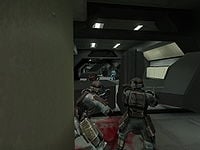Combat barrier: Difference between revisions
From Halopedia, the Halo wiki
No edit summary |
|||
| Line 8: | Line 8: | ||
Combat Barriers are placed around strategic sites as defensive mechanisms against enemy [[weapons]] fire. Several types of barriers exist, but all are made of thick battle plating presumably made of titanium or titanium-ceramic [[armor]]. | Combat Barriers are placed around strategic sites as defensive mechanisms against enemy [[weapons]] fire. Several types of barriers exist, but all are made of thick battle plating presumably made of titanium or titanium-ceramic [[armor]]. | ||
The purpose of combat barriers is to protect soldiers and Marines that are located in bases, dug-in fortifications, and other facilities, from the enemy. While they are almost impenetrable to [[plasma]] and projectile weapons, they do not protect well against the concussive force of an explosion such as a rocket or grenade impact, but do well to absorb shrapnel and flying debris. | The purpose of combat barriers is to protect soldiers and [[Marines]] that are located in bases, dug-in fortifications, and other facilities, from the enemy. While they are almost impenetrable to [[plasma]] and projectile weapons, they do not protect well against the concussive force of an explosion such as a rocket or grenade impact, but do well to absorb shrapnel and flying debris. | ||
==Sources== | ==Sources== | ||
Revision as of 16:09, April 28, 2008

A Combat Barrier is a mobile ground barrier used by United Nations Space Command forces. They can be deployed and set up relatively quickly to aid the defense of a strategic position. [1][2][3].
Background
Combat Barriers are placed around strategic sites as defensive mechanisms against enemy weapons fire. Several types of barriers exist, but all are made of thick battle plating presumably made of titanium or titanium-ceramic armor.
The purpose of combat barriers is to protect soldiers and Marines that are located in bases, dug-in fortifications, and other facilities, from the enemy. While they are almost impenetrable to plasma and projectile weapons, they do not protect well against the concussive force of an explosion such as a rocket or grenade impact, but do well to absorb shrapnel and flying debris.
Sources
- ^ Halo: Combat Evolved, level Pillar of Autumn
- ^ Halo 2, level Cairo Station
- ^ Halo 3, level Crow's Nest